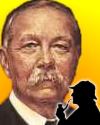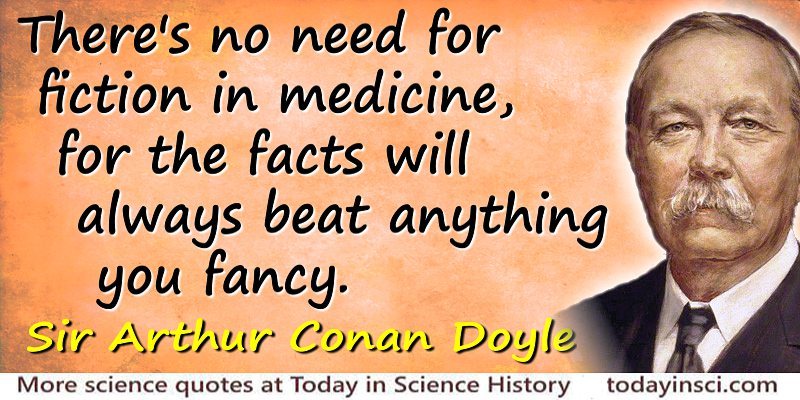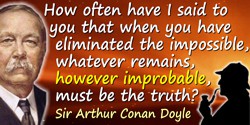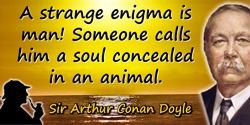 (source)
(source)
|
Sir Arthur Conan Doyle
(22 May 1859 - 7 Jul 1930)
Scottish author and physician who introduced the legendary character, Sherlock Holmes, in A Study in Scarlet (1887). Although he began a medical practice in 1882, it was his writings that became his career. Late in his life he became interested in spiritualism.
|
Arthur Conan Doyle
“No need for fiction in medicine”
Illustrated Quote - Large (800 x 400 px)
More Arthur Conan Doyle quotes on science >>
This quotes comes from Arthur Conan Doyle’s fiction book, Round the Red Lamp, which is a collection of short stories featuring the problems encountered by physicians and surgeons in their work. In fact, because of his education in medicine before he took to writing full-time, leaving Sherlock Holmes aside, Conan Doyle can easily spin yarns about medical life.
In his story called 'A Medical Document', three medical people are talking to each other. One, a general practioner named Foster, comes up with this line of thought, which begins:
“There’s no need for fiction in medicine … for the facts always beat anything you can fancy.”
He continues:
“But it has seemed to me sometimes that a curious paper might be read at some of these meetings about the uses of medicine in popular fiction … what diseases are made most use of in novels. Some are worn to pieces, and others, which are equally common in real life, are never mentioned. Typhoid is fairly frequent, but scarlet fever is unknown. … Then there is the mysterious malady called brain fever, which always attacks the heroine after a crisis, but which is unknown under that name to the text books. … The small complaints simply don’t exist. Nobody ever gets shingles or quinsy, or mumps in a novel. All the diseases, too, belong to the upper part of the body. The novelist never strikes below the belt.”
- Science Quotes by Sir Arthur Conan Doyle.
- 22 May - short biography, births, deaths and events on date of Doyle's birth.
- Sir Arthur Conan Doyle gave evidence on a proposed Daylight Saving Bill to a Parliamentary Select Committee hearing witnesses.
- Arthur Conan Doyle - context of quote “No need for fiction in medicine” - Medium image (500 x 250 px)
- Arthur Conan Doyle - context of quote “Extra hour of daylight” - Medium image (500 x 250 px)
- Arthur Conan Doyle - context of quote “Extra hour of daylight” - Large image (800 x 400 px)
- Booklist for Arthur Conan Doyle.









